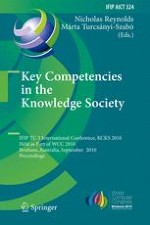This book constitutes the refereed proceedings of the IFIP TC 3 International Conference, KCKS 2010, held as a part of the 21th World Computer Congress, WCC 2010, in Brisbane, Australia, in September 2010.
The 43 revised full papers presented were carefully reviewed and selected from numerous submissions. The range of issues cover many aspects of ICT in relation to competencies in the knowledge society; they present theory, research, applications and practical experiences on topics including but not limited to developing creativity, digital solidarity, e-management in education, informatics and programming knowledge technologies, lifelong learning, policy development, teacher(s) in a knowledge society, e-inclusion, AGORA: the IFIP initiative on lifelong learning, collective intelligence, digital literacy, educating ict professionals, formal and informal learning, innovations of assessment, networking and collaboration, problem solving teacher learning & creativity as well as teaching & learning 2.0.
